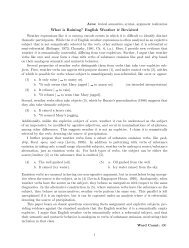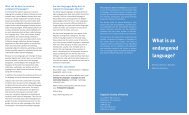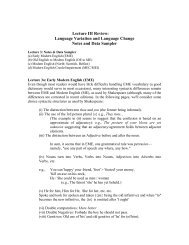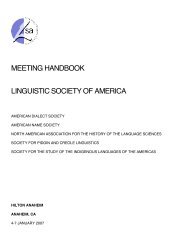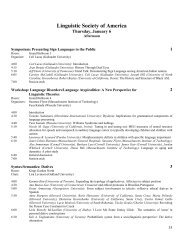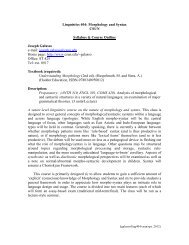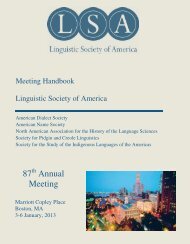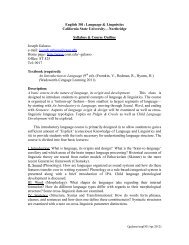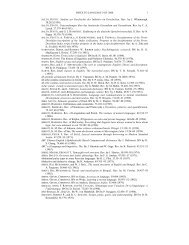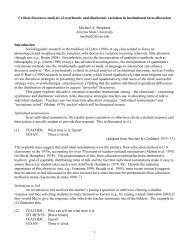here - Linguistic Society of America
here - Linguistic Society of America
here - Linguistic Society of America
You also want an ePaper? Increase the reach of your titles
YUMPU automatically turns print PDFs into web optimized ePapers that Google loves.
Phillip M. Carter (Florida International University) Session 58Andrew Lynch (University <strong>of</strong> Miami)David Neal (Empirica Research/University <strong>of</strong> Miami)Sociolinguistic and social psychological motivation for loss: Mapping the perception <strong>of</strong> Spanish and English among MiamiLatinosThis study applies the matched-guise technique, introduced by Lambert et al. (1960), to the study <strong>of</strong> Spanish/English bilingualismin metropolitan Miami.180 participants listened to four speakers in two guises (Spanish and English) and rated each on a 7-pointLikert-scale for a range <strong>of</strong> personal characteristics. They then answered hypothetical questions about each speaker’s estimatedincome, pr<strong>of</strong>ession, and family history. Results show complex interactions between listener ethnicity, language perception, andpolitical ideology. Surprisingly, all participants showed an implicit preference for the English guises for a majority <strong>of</strong>characteristics. This was true even for Latinos who at the explicit level valued bilingualism.Mirko Casagranda (University <strong>of</strong> Naples ‘L’orientale’)Session 67101 hills turned into islands: renaming the Caniapiscau ReservoirIn order to celebrate the 20 th anniversary <strong>of</strong> the Charter <strong>of</strong> the French language (Bill 101), in 1997 the Quebec Geographic NamesBoard created the “Garden at the End <strong>of</strong> the World” archipelago by naming 101 islands <strong>of</strong> the Caniapiscau Reservoir (Côte-Nord,Québec). The decision was fiercely opposed by the Cree community, which claimed that those islands did not need be named asthey already had First Nations names. After mapping the history <strong>of</strong> the controversy between the Cree community and theGovernment <strong>of</strong> Quebec, the paper aims at making a comprehensive list <strong>of</strong> the Cree toponyms and their etymology.Laura Staum Casasanto (Stony Brook University) Session 17Stefan Grondelaers (Radboud University Nijmegen)Roeland van Hout (Radboud University Nijmegen)Jos J. A. van Berkum (University <strong>of</strong> Utrecht)Peter Hagoort (Max Planck Institute for Psycholinguistics)Got class? Language attitudes and symbolic representations <strong>of</strong> social classIn recent years, researchers have successfully used information about cultural identity and consumption behavior to uncover classbasedvariation in linguistic production. But are judgments about such dimensions <strong>of</strong> class robust enough to be used to investigateclass-based language attitudes? We compared how listeners associate class-stratified variables with both classic and symbolicmarkers <strong>of</strong> class membership. Matching responses were significantly more likely than mismatching responses for all five types <strong>of</strong>class markers, and t<strong>here</strong> was no difference among them, indicating that representations <strong>of</strong> economic production, culture, orconsumption were equally good at probing attitudes about class-based linguistic variation in this community.Elizabeth D. Casserly (Indiana University) Session 17David B. Pisoni (Indiana University)Acoustic feedback perturbation as a window to complex phonological representationsThis paper describes the effects <strong>of</strong> real-time acoustic feedback degradation on speech production. Utterances from ten adult nativespeakers <strong>of</strong> English were recorded, both under normal conditions and while the participants heard themselves as though through acochlear implant processor. Acoustic-phonetic analysis <strong>of</strong> vowel quality before and during the feedback degradation revealedsignificant changes in F1 as a result <strong>of</strong> the transformation. Fluent speech also exhibited changes in the ratio <strong>of</strong> consonant versusvowel articulation time, with speakers spending more proportional time on consonant constrictions under conditions <strong>of</strong> degradedfeedback. Implications for theories <strong>of</strong> cognitive representation are discussed.Víctor Vázquez Castillejos (Smithsonian Institution) Session 103Emiliano Cruz Santiago (Smithsonian Institution)Mark A. Sicoli (Georgetown University)Gabriela Pérez Báez (Smithsonian Institution)Inflectional classes and tonal morphology across 10 Zapotec languages139



